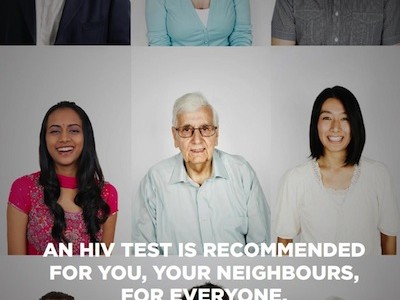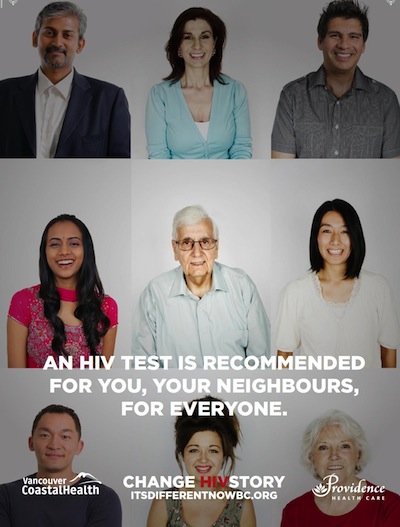Routine HIV testing comes to Richmond Hospital next week
Beginning February 11, physicians in the Richmond Emergency Department will offer an HIV test to their patients as part of routine care when they are ordering other blood tests. Routine HIV testing will expand to other areas of the hospital and community sites over the coming months.
Late diagnosis of HIV infection does not allow individuals to fully benefit from treatment. Most people newly diagnosed with HIV have had many missed opportunities in health care for HIV diagnosis. Admission to hospital is an excellent opportunity to screen all patients for HIV. Screening based on risk misses a substantial proportion of people with HIV. Most patients are at very low risk and will have a negative test result, but everyone who has ever been sexually active is at some risk of HIV. The Public Health Agency of Canada estimates one quarter of those living with HIV don’t know it; this is approximately 3,500 people in BC.
What do these changes mean?
By implementing routine, provider initiated testing we will help reduce the stigma associated with HIV testing and improve testing uptake. Routine HIV testing is acceptable to patients. Between October 2011 and June 2013, approximately 94% of the more than 5,000 patients offered an HIV test in Vancouver hospitals accepted it, when asked by their physician or health care provider.
Routine testing is proven to help
We know routine HIV testing works. Testing for HIV has already been included in routine care for all pregnant women in BC for many years. Most women are at low risk, but routine testing has almost eliminated mother-to-child transmission of HIV. In Vancouver hospitals, routine HIV testing has been in place since October 2011 and the positivity rate is approximately 3 per 1,000 patients among patients admitted to acute care. This is three times the cost-effectiveness threshold of 1 per 1,000.
Like diabetes, there is no cure for HIV. However, people with HIV who are diagnosed at an early stage of infection and treated can stay healthy. When patients regularly take HIV medication, they are less likely to pass the virus onto others. It’s up to us to identify those unaware and help them access treatment and support services.
HIV status affects many aspects of clinical care including treatment of infections and cancers, as well as basic health care such as immunizations. Knowing a patient’s HIV status should be a part of routine care.
The expansion of routine HIV testing in hospitals is part of the provincially funded Hope to Health HIV Initiative, which builds on the successful outcomes of the “Seek and Treat for Optimal Prevention (STOP) of HIV/AIDS” pilot project that ran from 2010-2013 in Vancouver and Prince George. Hope to Health is designed to expand prevention, testing, treatment, and support services to clinically eligible individuals in British Columbia.
Lions Gate Hospital started routinely offering HIV testing in the Emergency department on January 28th.
Why are we implementing HIV routine testing into acute care?
- Early diagnosis is known to improve patient outcomes and reduce the risk of transmission.
- People are not being diagnosed early enough. 60% of HIV patients are diagnosed after they should already be on treatment.
- Screening based on risk misses a substantial proportion of people with HIV. Patients are frequently unaware of their risk or if they are aware, they often do not disclose to their health care provider.
- Evidence shows that most people newly diagnosed with HIV have had many missed opportunities in health care for HIV diagnosis. Admission to hospital is an excellent opportunity to screen all patients for HIV.
- Routine HIV testing of all patients reduces stigma and improves early detection.
- HIV infection should be treated as early as possible. Early treatment prolongs and improves people’s lives. People on treatment can have healthy lives, relationships, and children.
- Most patients we test are at very low risk and will have a negative test. But, the only way to know for sure is to have a test.
- It is just as important for us to know if you are negative as knowing if you are positive.


